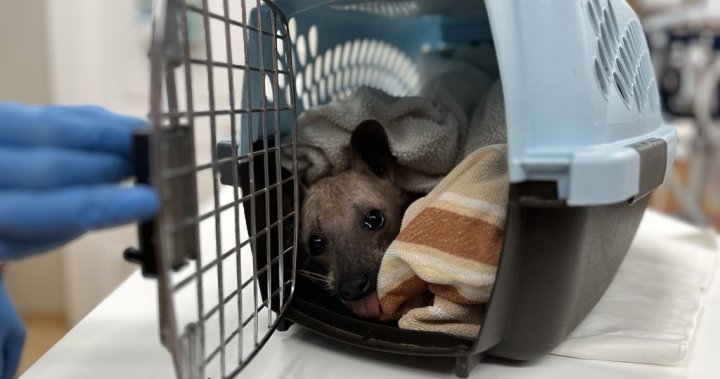A new animal at a Nova Scotia wildlife rehabilitation centre is raising eyebrows and attracting attention.
To look at her, one might not even know what kind of animal she is.
Rufus is a raccoon, but without the trademark black bandit-like mask and bushy ringed tail, she doesn’t look like one.
“It’s a clear case of alopecia, baldness. We do see it in squirrels and other species. Even humans have it, so it is out there, it’s genetic,” said Hope Swinimer, the founder of Hope for Wildlife rehabilitation centre.
“We do need to see whether we can help this raccoon.”
The centre, located in Seaforth, N.S., took the animal in about a week ago after receiving a call from Cape Breton reporting a rare sight: a bald raccoon.
The veterinary team performed a full medical examination Thursday, putting Rufus under anesthetic to conduct X-rays and to take a closer look at her skin.
The email you need for the day’s
top news stories from Canada and around the world.
The email you need for the day’s
top news stories from Canada and around the world.
“I didn’t find any parasites or any bacterial or fungal infections in her skin. We’re running some bloodwork on her just to check her organ function and her red and white blood cells,” explained Dr. Mikaela Jahncke, veterinarian.
Over the past few days, staff have noticed progress in Rufus, who they describe as “feisty.” In fact, staff are amazed she managed to make it through the winter without her fur and attribute her survival to that feistiness.
“She’s bright. She was a bit quiet initially, but she has found her spunk,” said Jahncke. “She’s acting like a wild raccoon, growling and a bit feisty, which is good. Those are things that we want to see.”
Staff at Hope for Wildlife describe Rufus the raccoon as “feisty.”
Staff at Hope for Wildlife lovingly named her Rufus after the naked mole-rat character in the cartoon Kim Possible, and now she’s gaining her own celebrity status.
They posted photos of Rufus on Facebook, where she’s found a legion of fans.
The next step is to continue to provide Rufus with supportive care to see how she heals. Eventually, she may be returned to the wild.
“The best case scenario is a healthy diet and an easy month or two might be good enough for her hair to grow back in,” said Swinimer.
If that doesn’t happen, Swinimer says Hope for Wildlife will seek permission from the Department of Natural Resources to keep her and give her a permanent home. At that point, Rufus would have a career as an education animal for the centre.
After all, Rufus teaches an important lesson.
“Her case just goes to show how resilient wildlife can be and they have a lot that’s thrown at them. They can overcome a lot,” said Jahncke.
“She has a long road to go ahead of her, but we’re not counting her out just yet.”
© 2024 Global News, a division of Corus Entertainment Inc.


